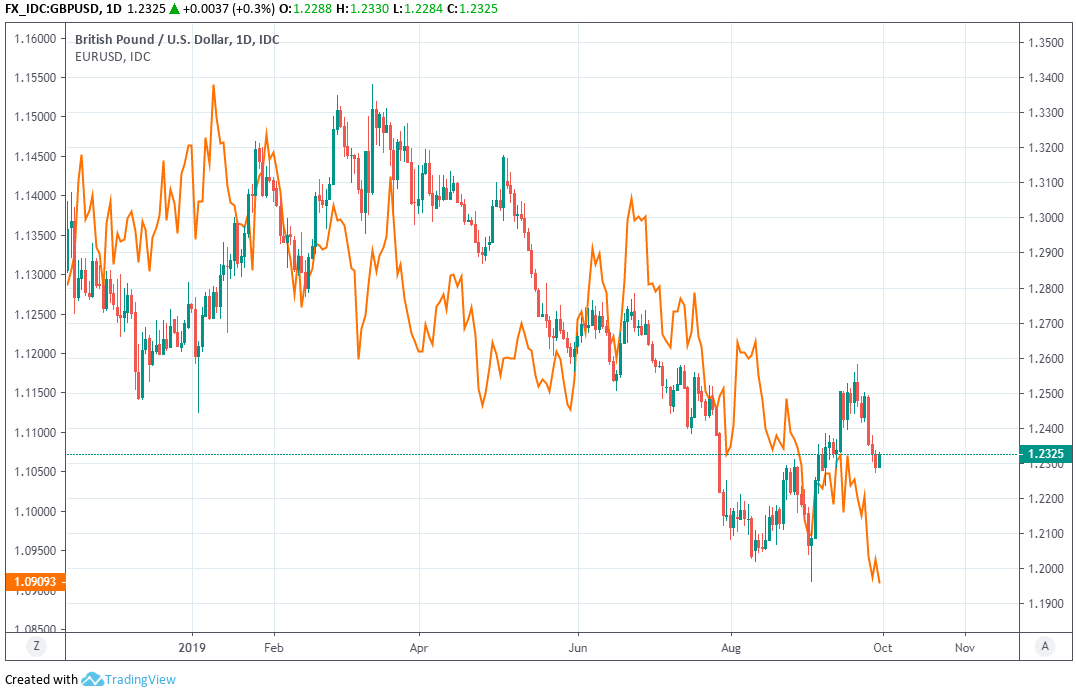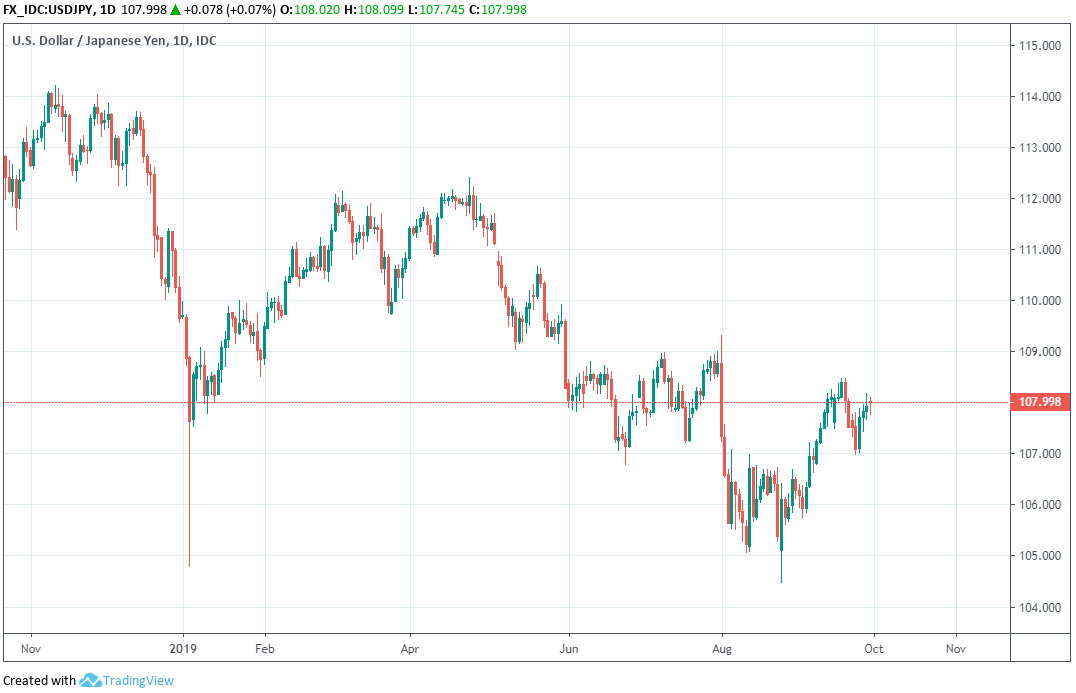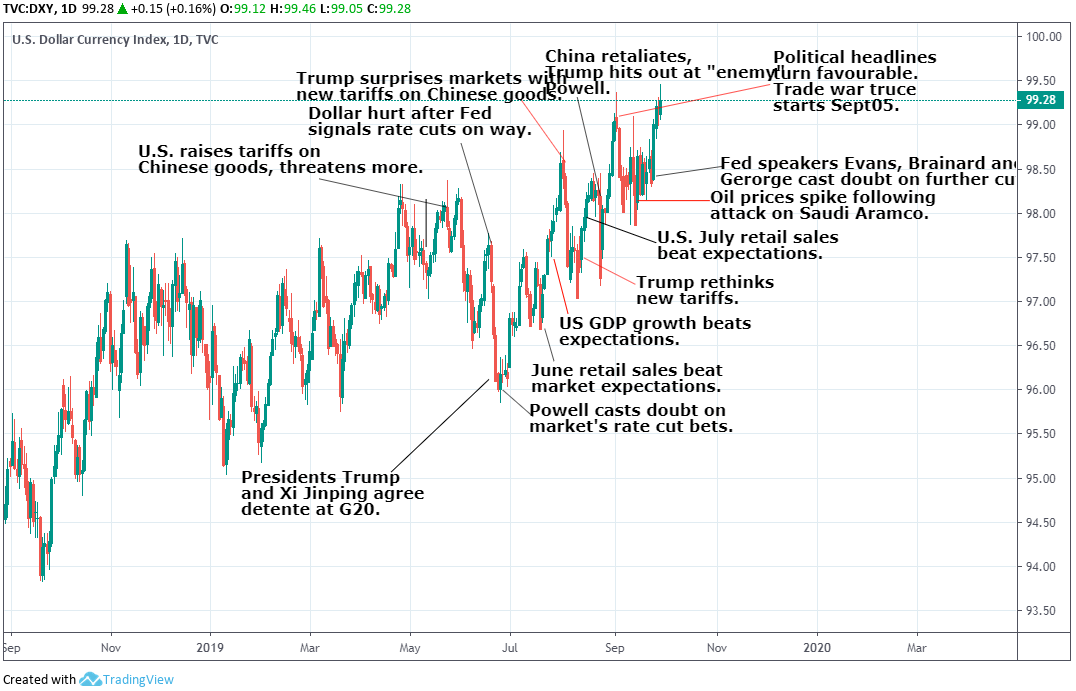Dollar Tipped to Remain Supported this Week as Trade Tensions Rankle and Economy Outperforms
- Written by: James Skinner

© GovernmentZA, image Reproduced Under CC Licensing
- USD supported as trade tensions weigh, economy outperforms.
- Markets eye trade escalation amid fears of U.S. capital controls.
- As data highlights continued economic outperformance in the U.S.
- ING lsays USD best of a bad bunch, says USD index to remain bid.
- RBC says September payrolls may see Fed cuts priced-out of market.
The Dollar advanced against all major rivals Monday as renewed trade tensions and a resilient domestic economy saw investors continue to bid for the U.S. currency which, billed by analysts as the best of a bunch, is tipped to remain supported throughout the new week.
Nonfarm payrolls numbers for September will round off on Friday what is set to be an action-packed week as far as economic statistics go, and one which analysts say should emphasise and underline the outperformance of the U.S. economy relative to its developed world counterparts. And that outperformance has been key to the Dollar's strength and resilience in the last 18 months.
"A series of US manufacturing surveys through the week will determine whether the slow-down in overseas trade continues to weigh on manufacturing confidence (Sep ISM released tomorrow) and add to fears over slowing investment," says Chris Turner, head of FX strategy at ING. "Were there better stories overseas, we suspect the dollar might be a little weaker right now, but there are not (industrial production numbers are still plumbing the depths in many countries) and thus the dollar is holding its gains. We would still, however, favour long JPY positions on the crosses, e.g. against European currencies. DXY to stay bid near 99.0/50."
Above: Dollar Index shown at daily intervals.
Chinese growth is slowing, Europe's economy is widely believed to be stagnating and Germany's economy already looks to be in recession due mainly to the damaging impact that President Donald Trump's trade war has had on international trade and manufacturing sectors the world over. This has already seen the European Central Bank (ECB) rush to support growth with an interest rate cut and fresh round of quantitative easing. The ECB deposit rate is now -0.50% and its main interest rate still at 0%.
Meanwhile, U.S. rates are at least twice as high those of other major central banks except those in Canada and Norway, and the number of positive U.S. 'data surprises' this year is high and rising, with the economy continuing to outperform expectations as well as rivals. The contrast between the 2% rate of the Federal Reserve and its 0% European equivalent is one reason the Dollar has been so strong in recent months, because the U.S. bond market is the only game in town for yield hungry investors.
With the Euro-to-Dollar pair accounting for around half of the Dollar index, the broad measure of the U.S. currency is heavily influenced by the performance of the Euro. This makes economic divergence between the U.S. and Euro area a key driver of Dollar performance.
"We remain USD bulls, with a weak EUR bearing the brunt. We see limited scope for further policy accommodation without a weak EUR and persistent issues in manufacturing. GBP is a hostage to politics; and while the bad news is priced in, there is no catalyst in sight for a bounce. The AUD will trade alongside the ebbs and flows of the trade war; while in NZ, recent weakness in the domestic pulse will weigh. CNY will grind lower alongside the weaker economic pulse," says Daniel Been, head of FX strategy at ANZ.

Above: Pound-to-Dollar rate shown at daily intervals alongside EUR/USD (orange line, left axis).
U.S. growth has slowed in 2019 and the Fed has cut rates twice already as a result, although the Dollar has continued to strengthen. That's partly because other economies are slowing too, which has led their central banks to cut rates and in process, to offset the impact of the Fed's cuts on the perceived attractiveness of U.S. assets.
However, continued outperformance by the U.S. economy simply risks further entrenching the interest rate disparity and leaving U.S. bond markets the only game in town for yield hungry investors for a while longer. That would mean the Dollar remains stronger for longer.
Financial markets are betting the Fed will cut its interest rate again in December, leaving it at 1.75%, and that it will slash the Fed Funds benchmark on at least two occasions next year. But the bank hinted pretty strongly this month that it currently has no intention of indulging the speculators behind those wagers.
"Having been relentlessly negative through the summer months, US activity data surprises have turned significantly positive," says Adam Cole, chief FX strategist at RBC Capital Markets. "While we expect a December Fed cut to remain baked into expecations, in a busy week for US data releases, the risk is that markets continue to price out the additional easing priced for 2020 and USD/JPY is the G10 pair most leveraged to this."
Cole is betting the USD/JPY rate will rise from 107.80 to 109.90 over the course of this week, ING's Turner is looking for the Dollar Index to retread the familiar 99-99.50 range and Australia's ANZ is tipping a continued strong performance from the Dollar as well. However, this weeks manufacturing and payrolls data will come amid fresh trade tensions, which are stoking increased fears for a global economy that has already been badly damaged by the 18-month long tariff fight between the U.S. and China.

Above: USD/JPY rate shown at daily intervals.
"October will not be a simple month to navigate," says ANZ's Been. "No theme is likely to be as important as the US-China trade negotiations."
Bloomberg News reported Friday that President Donald Trump is contemplating limiting portfolio flows to China, an aggressive step that would mark a significant escalation of the trade war. He's also reportedly mulling restrictions on Chinese companies' access to U.S. stock markets too. Restricting 'portfolio flows' would involve limiting the amount of debt and stock that American money managers can buy in China.
Foreign holdings of Chinese stocks and bonds remain small but strong earlier growth in the world's second largest economy has left it increasingly in need of outside capital, which is why the country has begun to relax some rules in recent years. President Trump's plans, if gone through with, would put a roadblock in China's path and would amount to something like an act of 'wounding with intent' in the trade war that had seemed to freeze throughout September.
The two sides are set to hold negotiations on October 10 and 11, although hopes have of a breakthrough that at least freezes the tariff fight for a while longer have wained since last week. And on October 15, the White House is set to lift from 25% to 30% the tariff rate imposed on around $250 bn of China's annual exports to the U.S. unless a deal averting the increase is reached before then. Another tariff of 15% targeting $160 bn of consumer goods is then expected to be imposed on December 15.
Time to move your money? Get 3-5% more currency than your bank would offer by using the services of foreign exchange specialists at RationalFX. A specialist broker can deliver you an exchange rate closer to the real market rate, thereby saving you substantial quantities of currency. Find out more here.
* Advertisement





